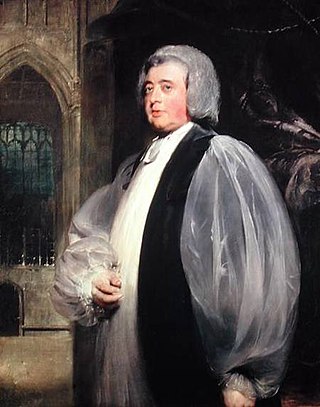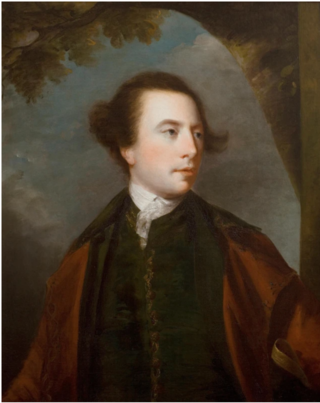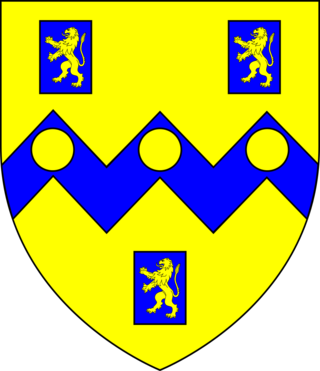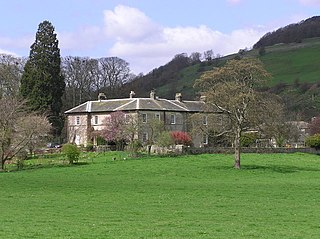
John Moore was Archbishop of Canterbury in the Church of England.

Peregrine Bertie, 2nd Duke of Ancaster and Kesteven, styled The Honourable Peregrine Bertie between 1686 and 1704, Lord Willoughby de Eresby between 1704 and 1715 and Marquess of Lindsey between 1715 and 1723, was a British politician who sat in the House of Commons from 1708 until 1715 when he was called to the House of Lords.

General Peregrine Bertie, 3rd Duke of Ancaster and Kesteven, styled Lord Willoughby de Eresby from 1715 to 1723 and Marquess of Lindsey from 1735 to 1742, was an English peer.

Montagu Bertie, 2nd Earl of Lindsey, KG, PC, was an English soldier, courtier, and politician who sat in the House of Commons between 1624 and 1626. He was created Baron Willoughby de Eresby by writ of acceleration in 1640 and inherited the peerage of Earl of Lindsey in 1642. He fought in the Royalist army in the English Civil War.

Guy's Cliffe is a hamlet and former civil parish on the River Avon and the Coventry Road between Warwick and Leek Wootton, in the parish of Leek Wootton and Guy's Cliffe, in the Warwick district, in Warwickshire, England, near Old Milverton. In 1961 the parish had a population of 2.
Willoughby Bertie, 3rd Earl of Abingdon, of Wytham Abbey, Berkshire and Rycote, Oxfordshire, was an English landowner and Tory politician who sat briefly in the House of Commons in 1715.

Charles Bertie of Uffington, near Stamford, Lincolnshire was a British politician who sat in the House of Commons from 1711 to 1727.

Bertie Greatheed (1759–1826) was an English dramatist, slave owner and landowner.
Thomas Fry was a deputy governor of the Colony of Rhode Island and Providence Plantations.

John St. Leger Douglas was an 18th-century member of the House of Commons of Great Britain. He owned Springfield Place, near Chelmsford, Essex.

Vere Poulett, 3rd Earl Poulett, styled The Honourable Vere Poulett until 1764, was an English peer.
Samuel Shepheard (1677–1748), of Exning, Suffolk, near Newmarket, Cambridgeshire, was an English Tory politician who sat in the English House of Commons in 1701 and in the British House of Commons almost continually for forty years from 1708 to 1748.

Crisp Molineux (1730–1792), of Garboldisham, Norfolk, was an English politician.

John Rolle (1679–1730) of Stevenstone and Bicton in Devon, was a British landowner and Tory politician who sat in the English House of Commons from 1703 to 1705 and in the British House of Commons from 1710 to 1730. He declined the offer of an earldom by Queen Anne, but 18 years after his death his eldest son was raised to the peerage in 1748 by King George II as Baron Rolle.
William Hiorne was an architect and builder based in Warwick.
Peregrine Bertie was a Tory Member of Parliament. Member of a junior branch of the Bertie family seated at his mother's estate of Low Leyton, Essex, he was returned for Westbury from 1753 to 1774 by the senior branch of the family, the Earls of Abingdon, where he was in continuous opposition to the successive Whig administrations.
Norreys Bertie was an English Tory politician. From a junior branch of the Bertie family which had inherited estates at Weston-on-the-Green in Oxfordshire, he represented that county in Parliament from 1743 until standing down before the bitterly contested 1754 election. He was unfriendly to the Hanoverian succession and sat in opposition to the government.

Edward Ashe of Heytesbury, Wiltshire was an English landowner, and Member of Parliament for Heytesbury for 52 years, from 1695 to 1747.
Isabella Susan Percy, Countess of Beverley, formerly Isabella Susan Burrell, was the wife of Algernon Percy, 1st Earl of Beverley, and the mother of the 5th Duke of Northumberland.

Henry Drax of Ellerton Abbey, Yorkshire and Charborough, near Wareham, Dorset was a British Whig politician who sat in the House of Commons between 1718 and 1755.













